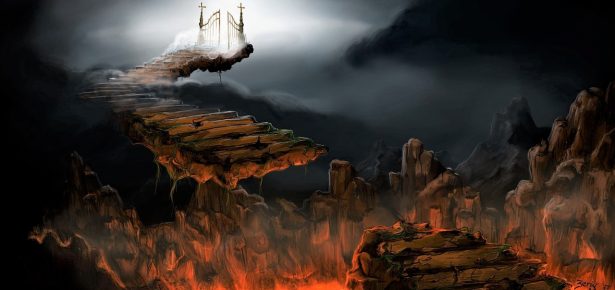
The afterlife as envisioned by medieval Europeans was both a strange and familiar place. For us, hell conjures images of fiery rivers and demons, while heaven calls to mind shining white figures in repose. The same things appear in medieval descriptions. Yet these same texts, which were frequently based on the supposed reports of the visions experienced by individuals near death, contain accounts of the otherworld much more detailed and nuanced than we are used to seeing. They contain surprisingly elaborate landscapes, with wondrous many-fruited trees and golden cities, or mile-long bridges, freezing valleys, towering walls, even smoke-filled castles where the poor inhabitants suffer like well-cured hams!
To be honest, though, none of this used to interest me in the slightest. My Cambridge PhD (2006–2009) thesis was in fact titled “Literary Culture in Ninth-Century Northern Italy”. During my research, I read my supervisor Rosamond McKitterick’s then-latest book, Charlemagne (Cambridge, 2008), and there found something that piqued my interest. Apparently ‘Wetti of Reichenau[‘s] … vision of hell included Charlemagne with an (unspecified) animal gnawing his genitals’ (91). I felt compelled to investigate such a dramatic image myself, and spent some of my summer vacation at home in Kingston reading a copy of the Latin text of the ninth-century Vision of Wetti. I discovered that Charlemagne is in fact a very minor character in the text: instead, the text is more about the imperfect monk Wetti’s personal redemption, which requires prayers by many groups of saints in heaven, and then of his friends on earth – as I explore in my contribution to Imagining the Medieval Afterlife.
After my PhD, my interest in the medieval afterlife continued to grow as I laid the groundwork for a new edition of the Vision of Wetti. After stints at the British School at Rome and UCLA, I found myself back in Canada, teaching at the University of British Columbia, Vancouver. There, in 2013, I had the opportunity to teach an advanced seminar on the history of the afterlife in the West, starting with Homer and ending with Dante. But what would we read? There was one collection of afterlife texts by Eileen Gardiner (Visions of Heaven & Hell before Dante, 1989), but where could my students find some guidance? The main overviews for medieval afterlife visions were the important books by Peter Dinzelbacher and Claude Carozzi. Since these were respectively in German and French, I did not think my anglophone students would appreciate them being assigned. Instead I had to make do with the English version of Jacques Le Goff’s (in)famous Birth of Purgatory (orig. 1981 La Naissance du Purgatoire), which, as the title suggests, concerns itself mainly with the history of only one part of the afterlife.
Imagining the Medieval Afterlife is, at long last, the answer to my conundrum. Thanks to its outstanding, patient, and capable contributors, it contains everything I could have possibly wished to give my students: chapters that explore how the afterlife was depicted in Western visionary texts, theological texts, and even art, from Antiquity to the sixteenth century. It is more than just a synthesis, however. Where Le Goff and others privileged the central Middle Ages (1000–1200) in their histories, these new contributions collectively argue that the early (500–1000) and later (1200–1500) Middle Ages were more important in making the “medieval” afterlife.
After editing this volume, I feel that I was incredibly lucky to chance upon the Vision of Wetti in Rosamond’s book. I am now convinced that depictions of the afterlife permit us to enter into ‘l’intimité d’une société passée’ (to quote Michel Aubrun), affording us a glimpse of the ‘hopes and fears, toils and pleasures, of the Middle Ages’ (Christopher Holdsworth).
Latest Comments
Have your say!